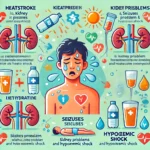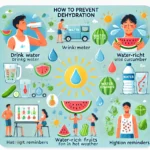Introduction
Dehydration is a condition that occurs when the body loses more fluids than it takes in, leading to an insufficient amount of water to carry out normal bodily functions. Water is essential for regulating body temperature, maintaining healthy skin, supporting digestion, and transporting nutrients. Even mild dehydration can affect your physical and mental performance. This blog post will provide a comprehensive understanding of dehydration, including its causes, symptoms, risk factors, prevention strategies, and treatment options.
What Causes Dehydration?
Dehydration can result from a variety of factors, including:
- Inadequate Fluid Intake: Not drinking enough water, especially during hot weather or while exercising, can quickly lead to dehydration.
- Excessive Sweating: High-intensity activities or hot environments increase sweat production, causing significant fluid loss.
- Illnesses: Conditions like fever, vomiting, and diarrhea,loose motion can lead to rapid fluid depletion.
- Frequent Urination: Certain medical conditions like diabetes or the use of diuretic medications can cause increased urination.
- Alcohol Consumption: Alcohol is a diuretic, leading to increased urination and fluid loss.
- Burns and Skin Injuries: Damage to the skin can cause fluids to leak from the body, increasing dehydration risk.
- Climate Conditions: Hot, humid weather accelerates fluid loss through sweating.
Symptoms of Dehydration
The symptoms of dehydration can vary depending on the severity of fluid loss. Common signs include:
- Mild to Moderate Dehydration:
- Dry mouth and tongue
- Thirst
- Dark-colored urine
-

Fatigue
- Dizziness or lightheadedness
- Dry skin
- Decreased urine output
- Severe Dehydration:
- Rapid heartbeat and breathing
- Confusion or irritability
- Sunken eyes
- Lack of sweating
- Very dark urine or no urination
- Fainting
- Low blood pressure
- Cool, clammy skin
Who Is at Risk?
While dehydration can affect anyone, some groups are more vulnerable
- Infants and Young Children: They have higher water needs relative to their body weight and can lose fluids rapidly.
- Older Adults: The sense of thirst diminishes with age, increasing the risk of dehydration and dismissing the health .
- Athletes: High physical activity levels can lead to significant fluid loss through sweat and the body is tired.
- People with Chronic Illnesses: Conditions like diabetes, kidney disease,skin problems and heart problems can increase the risk.
- Pregnant and Breastfeeding Women: Fluid demands are higher during pregnancy and lactation.
- Individuals Living at High Altitudes: Higher altitudes can increase urination and more rapid breathing, leading to fluid loss.
Complications of Dehydration
If left untreated, dehydration can lead to serious health complications, such as
- Heat Injuries: Cramps, heat exhaustion, or heat stroke brain stroke.
- Urinary and Kidney Problems: Urinary tract infections, kidney stones, or even kidney failure.
- Seizures: Electrolyte imbalances can trigger involuntary muscle contractions and loss of consciousness.
- Hypovolemic Shock: A life-threatening condition caused by low blood volume, leading to a drop in blood pressure and oxygen supply.
How to Prevent Dehydration
Prevention is the best approach to managing dehydration:
Drink Adequate Fluids: Aim for at least 8 glasses of water daily, and increase intake during hot weather or physical activity.
Monitor Urine Color: Light-colored urine usually indicates proper hydration, while dark urine may signal dehydration.
Eat Water-Rich Foods: Fruits and vegetables like watermelon,carrots, cucumber, and oranges help maintain fluid balance.
Avoid Excessive Alcohol and Caffeine: These can increase fluid loss through urination.
Adjust Fluid Intake When Sick: Increase fluids during illness, especially with fever, vomiting, or diarrhea.
Set Hydration Reminders: Use apps or alarms to remind you to drink water regularly.
Dress Appropriately: Wear light, breathable clothing in hot environments to reduce sweat loss.
- Treatment for Dehydration
- Mild Dehydration:
- Rehydration with Water: Sip small a
 mounts of water frequently.
mounts of water frequently. - Oral Rehydration Solutions (ORS): These contain electrolytes to help restore the body’s fluid balance.
- Rehydration with Water: Sip small a
- Moderate to Severe Dehydration:
- Medical Attention: Seek immediate medical care.
- Intravenous (IV) Fluids: Administered in hospitals to quickly replenish lost fluids and electrolytes.
- Monitoring Vital Signs: Healthcare providers will monitor blood pressure, heart rate, and urine output.
When to Seek Medical Help
- Consult a healthcare provider if you experience:
- Inability to keep fluids down

- Persistent diarrhea or vomiting
- High fever
- Signs of severe dehydration like confusion, rapid heartbeat, or fainting
- Dizziness upon standing
- No urination for 8 hours or more
Dehydration in Special Populations
- Children: Watch for signs like lack of tears when crying, dry diapers for several hours, and listlessness.
- Older Adults: Encourage regular fluid intake, even if they do not feel thirsty.
- Athletes: Hydrate before, during, and after intense exercise. Use electrolyte-rich sports drinks during prolonged activities.
Myths and Misconceptions About Dehydration
- Only Water Can Hydrate You: While water is the best option, other beverages and hydrating foods also contribute.
- Thirst is the Only Indicator of Dehydration: Thirst can be a late sign, especially in older adults. Monitor urine color and physical symptoms.
- You Need 8 Glasses of Water a Day: Hydration needs vary based on age, activity level, and climate.
Conclusion
Dehydration is a common yet preventable condition. By understanding its causes, recognizing the symptoms early, and maintaining proper hydration habits, you can safeguard your health. Always listen to your body’s signals, and make hydration a priority in your daily routine. Remember, staying hydrated isn’t just about drinking water; it’s about adopting a lifestyle that supports your body’s fluid needs. Prioritize hydration for optimal physical and mental well-being.






